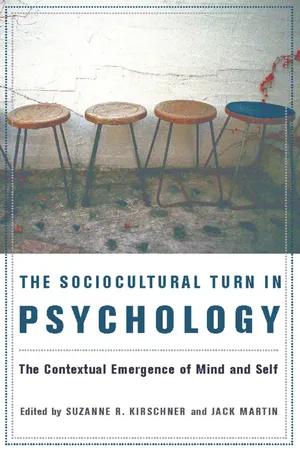Psychology
Sociocultural Perspective in Psychology
The sociocultural perspective in psychology emphasizes the influence of social and cultural factors on an individual's behavior, thoughts, and emotions. It examines how societal norms, cultural values, and social interactions shape an individual's psychological processes and development. This perspective highlights the importance of considering the broader social and cultural context when understanding human behavior and mental processes.
Written by Perlego with AI-assistance
Related key terms
5 Key excerpts on "Sociocultural Perspective in Psychology"
- eBook - ePub
Child Development
Theories and Critical Perspectives
- Rosalyn H. Shute, Phillip T. Slee(Authors)
- 2015(Publication Date)
- Routledge(Publisher)
it made no sense at all to control for ethnicity, social class, or household composition in an attempt to produce ‘pure’ process. No process occurs outside of a context. And if we want to understand context, we need to take it into account, not pretend to control it away.(Bronfenbrenner and Morris, 1998: 1,016)Like Bronfenbrenner, the dialectical psychologist Klaus Riegel developed his theory in the USA in the 1970s (see Chapter 7 ). Influenced by the earlier Soviet-based work of Sergei Rubinstein rather than Vygotsky, he maintained that it was inappropriate to study the isolated individual as the focus of development; rather, the individual can only be understood in relation to historical and societal changes regarding issues such as demography, political structures and majority–minority group relations. Thus, the individual does not just exist within the boundaries of the body, but within a ‘psychological space’ that encompasses interactions with family, friends and the broader culture (Meacham, 1999).In a similar vein, Joan Miller (1999) distinguished between ecological perspectives and the approach of cultural psychology. The former sees culture as merely providing a context for development: development happens through universal processes and mechanisms, with culture merely providing specific content. The cultural approach, by contrast, is concerned with shared meaning systems, so that psychological notions such as ‘mind’, ‘self’ and ‘emotion’ are themselves culturally created and understood. From the perspective of cultural psychology, cultural practices are not based only on adaptive considerations, but may be nonrational, such as when people refuse to eat certain animals for cultural reasons although they are edible. Psychological explanations therefore need to take account not just of the person and the ecological context, but also of the culture. - eBook - ePub
Reconstructing Undergraduate Education
Using Learning Science To Design Effective Courses
- Robert B. Innes(Author)
- 2004(Publication Date)
- Routledge(Publisher)
Chapter 5
Sociocultural Perspectives on Learning
Sociocultural theories focus on the role of social, cultural, and physical contexts on meaning making with an emphasis on the role of social context and social practices. Other labels applied to these theories include “social constructionism,” “social constructivism,” “the sociocentric view,” and “the interactionist approach.” Sociocultural theories focus on the learner’s participation in the social practices of the setting, community, and culture. These views see knowledge as developed in discourses carried on by groups of people. Meaning making begins in the cultural context and involves other people in their community of practice, as well as cultural artifacts and symbolic tools. Learning is seen as a process of becoming more centrally involved in a community of practice (Lave & Wenger, 1991)—as “becoming attuned to constraints and affordances of activity” (Greeno & the MSMTA Project Group, 1998). Socioculturalists believe that our sense that our selves and ideas are independent (that we process stimuli and build ideas about things in the world from the inside out) is illusory. They view the mind and cognitive structures (schemas, mental models, concepts) as distilled from participation in social practices rather than as internal mental processes.As in psychological constructivist theories, there is a range of positions between what might be referred to as a radical sociocultural view represented by Gergen’s social constructionism to views like Vygotsky’s that are anchored in the social context, but include cognitive structures. Socio cultural theories are historically associated with activity theorists such as Vygotsky and Leont’ev and share many characteristics with modern situated cognitive perspectives. A common thread that runs through these theories is the idea that the mind is not contained totally “in the head.” In Vygotsky’s theory, the human mind does not make direct contact with the world, but relates to the real world through a range of mediating structures such as language and other cultural artifacts and institutions (Lantolf, 2000). In contrast to psychological constructivist views that focus on how knowledge is structured in the mind, sociocultural and situated cognitive perspectives examine the ways that factors like classroom organization and the patterns of communication in a group help or hinder learning. Many researchers in the sociocultural and situated cognition tradition have examined the process by which novices (especially apprentices) increasingly adopt the system of communication and behavior of experts (Lave & Wenger, 1991). In these models of learning, expertise is not acquired through direct instruction, but through increasing participation in a community of practice. These approaches share Dewey’s conclusion that meaning is socially constructed—a product of socially shared behavior (Garrison, 1994a). - eBook - ePub
- R. F. Kidd, M. J. Saks(Authors)
- 2013(Publication Date)
- Psychology Press(Publisher)
raison d'êetre for the field, social psychology's identity will remain unclear and progress toward developing theory and useful research will be limited.NATURE OF SOCIAL PSYCHOLOGY'S PERSPECTIVE
It has been noted by Thorngate (1976) that “social psychology could be an organized comprehensive science were it not for its subject matter [p. 135].” This observation is, perhaps, even more true in 1982 than in the mid-1970's as social psychologists find themselves working, not only in isolated laboratories, but in hospitals, schools, prisons, and any number of other settings. The settings, and thus the problems dealt with by social psychologists, represent a diverse lot, and they are approached by almost as diverse a set of theories and methods. A cynical quip might be that social psychological research is defined only by the researcher's identity as a social psychologist.Despite the simplistic attractiveness of such a cynical view, social psychology would seem to require more in common than the researcher's mere identity. In fact, social psychologists share a perspective on the world that is unique, both as compared to other social scientists and as compared to nonsocial scientists. Two principal dimensions of this perspective can be described; one having to do with theory, one with method. Describing each dimension is a bit like peeling an onion—depending on the desired level of analysis, another aspect of the perspective can be identified. At a general level, the theoretical component of the perspective is social psychology's focus on the behavior of individuals in interaction (situationalism); the methodological focus concerns the emphasis on knowing through research (empiricalism). To be sure, as the onion is peeled and details revealed, disparate elements of the field appear and a coherent description is difficult; nevertheless, there remains a core perspective shared by social psychologists that distinguishes the field. - eBook - ePub
- Miles Hewstone, Wolfgang Stroebe, Klaus Jonas, Miles Hewstone, Wolfgang Stroebe, Klaus Jonas(Authors)
- 2016(Publication Date)
- BPS Blackwell(Publisher)
Völkerpsychologie (normally translated as ‘folk psychology’), which included discussion of differing cultures around the world. More recently psychologists have discussed cultural differences in terms of variations in attitudes, values and beliefs. These variations can contribute to our understanding of the concept of culture if we take them into account. In the remainder of this chapter, we examine studies that are relevant to issues that have been discussed in preceding chapters, particularly in relation to social cognition, self-concept, personal relationships, group behaviour and intergroup relations. In each of these areas we will show how attention to cultural differences can enrich our understanding of social psychological processes.CULTURE AND CULTURAL DIFFERENCES
What is culture and why should we study it?
The opening chapter of this book discusses some of the best-known and frequently discussed social psychology experiments. Most of these experiments were conducted in the United States and some in the United Kingdom. What would happen if they were repeated somewhere else in the world? We can answer this question, because there have been attempts at cross-cultural replication of all these studies, some of them many times. Consider first an early study of group dynamics that was published by Schachter (1951). In this study, Schachter set up a series of student discussion groups. Unknown to most group members, each group contained an accomplice of the experimenter. The accomplice (the ‘deviate’) was instructed to take up a position opposed to the views of the majority and stick to his position. Schachter predicted that the deviate would over time receive less and less attention and be rejected by the group, which is just what he found among his US respondents.cross-cultural replication a test of whether the results of a study are the same if it is repeated as exactly as possible in another cultural context.A few years later, Schachter and seven colleagues (1954) reported on the results of a slightly different version of this study that was conducted in seven different European nations. In this case, groups of 11-year-old schoolboys were asked to decide which of several model aeroplanes to build. The results were complex and not at all as the experimenters had predicted. The groups in France did almost all reach agreement and did reject the deviate, as predicted. However, many of the groups in Belgium, West Germany (as it was then known) and the UK did not reach agreement at all, and ratings on a 7-point scale as to whether the deviate should leave the group varied greatly between nations, as shown in Figure 15.1 - eBook - ePub
The Sociocultural Turn in Psychology
The Contextual Emergence of Mind and Self
- Suzanne Kirschner, Jack Martin(Authors)
- 2010(Publication Date)
- Columbia University Press(Publisher)
All of the sociocultural perspectives discussed in the various chapters of the current volume envision human beings’ basic condition as one in which we act, and are formed, within practices and traditions of living; thus, they consider psychological persons to be contingently constituted through relations and interactions with others. Such an orientation and emphasis should not be confused with strong forms of social determinism, and they certainly are incompatible with attempts to reduce our psychological being to our biological bodies and brains. Both society and biology are absolutely necessary conditions for human activity in the world, and therefore for the sociocultural, relational constitution and emergence of psychological being and understanding. However, such conditions stop well short of full determination, and the emergence that continually characterizes our ongoing worldly interactivity is transformative of both our selves and our societies. Nonetheless, the sociocultural practices and traditions within which we develop as psychological beings provide pragmatic warrants for our understandings of our selves, our experiences, and our condition.Surely it is not mere coincidence that these sociocultural perspectives have become elaborated in new ways, and sparked intensified interest, at a time when biological approaches to psychology are in greater ascendance than ever before. Although neuroscience and behavior genetics, along with the methods and technologies that accompany these endeavors, hold enormous promise for the advancement of knowledge, and for human betterment, they also engender concern on the part of psychologists and many others. In part this is due to their association, both in the public imagination and in the minds of at least some scientists, with reductionism and strong versions of determinism that discount the possibility of a human agency that matters. But even more worrisome is the prospect that the increasing visibility and power of such approaches will erode awareness that there are viable and robust perspectives on human being and social life that are fundamentally compatible with materialism yet also do justice to humans’ deeply sociocultural and historical nature (Harrington, Deacon, Kosslyn, and Scarry 2001; Kirschner 2006; Martin 2000; Shweder 2001). Thus it has never been more important to promote conversation about what kind of beings we are, and what kind (or kinds) of psychology are most adequate to study, understand, and support human flourishing.
Index pages curate the most relevant extracts from our library of academic textbooks. They’ve been created using an in-house natural language model (NLM), each adding context and meaning to key research topics.




